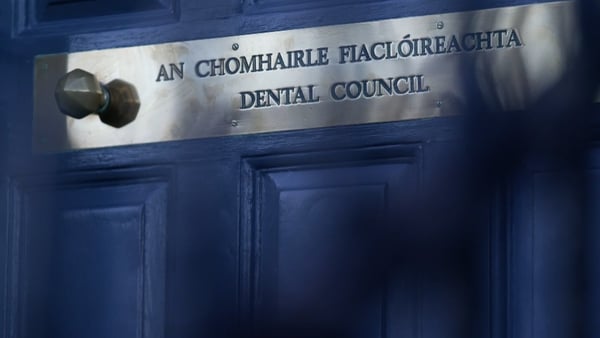RTÉ Investigates broadcasts a special undercover report on Thursday revealing how some landlords in Ireland are seeking sex from often vulnerable prospective tenants in exchange for reduced rent, or free accommodation.
Several organisations have raised concerns about what they say is a growing problem. In 2022, a bill aimed at criminalising the behaviour stalled in the Oireachtas at committee stage.
Minister for Justice Helen McEntee has described sex for rent as "an appalling abuse of power". Yet it is likely to be some time before any new laws are implemented.
So, what is known about the prevalence of sex for rent propositions and what could be done to address the problem?
Ireland's homeless figures are at all-time high with those housed in emergency accommodation recently exceeding 12,000 people.
On the other side, the latest rent report from the property listings website Daft.ie said that as of 1 May just 959 homes nationwide were advertised for rent – equalling the lowest levels recorded since Daft’s records began in 2006.
Of that figure, fewer than 500 homes were in Dublin. The average rent nationally was put at €1,750.
Faced with such stark prospects, it may be unsurprising those in desperate need may feel they have been left with little choice but to consider all options to keep a roof over their heads.
Increasingly among those choices, it appears, is sex for a reduced or free rent.
"What you have right now is something of a perfect storm in terms of the vulnerability that has opened up around housing and around finding somewhere to rent and accommodation," Dr Clíona Saidléar, executive director of the Rape Crisis Network Ireland (RCNI) told RTÉ Investigates.
"There is a certain cohort of society where this [sex for rent] has become a normalised or somewhat tolerated aspect of looking for a house and that’s utterly unacceptable."
How often potential renters are asked to consider sex as a form of payment for accommodation has not been statistically examined in Ireland.

Without such data it's difficult to ascertain the true extent of the problem. RCNI says there is growing anecdotal evidence of it happening and that would match what has happened in the UK, where data has been gathered.
The UK homeless organisation Shelter found from March 2020 to September 2021, 59,000 women in Britain were propositioned by a landlord to exchange reduced rent or accommodation for sex. If those figures were applied to Ireland that would mean almost 4,000 prospective renters had been propositioned here in the same timeframe. That’s 4,000 women over an 18-month period.
Indeed, given the particularly severe nature of Ireland’s current housing crisis in comparison to that being experienced in the UK, that figure may be conservative.
"The most vulnerable people are women," said former principal psychiatric social worker Kieran McGrath.
"Young women who are in poor circumstances either because they can’t afford rent, because they are immigrants, they are homeless, they’ve broken up from a relationship and they’ve nowhere to go.
"Basically, they are essentially destitute in an economic sense and can’t afford the very high rents that we have and maybe they don’t have any kind of social support where they have family or friends who could take them in. And they’re just desperate for somewhere."
Last year, a new bill that proposed criminalising the behaviour came to a halt at committee stage in the Oireachtas. The Ban on Sex for Rent Bill had sought to create two new offences criminalising both the person stipulating sex as a condition of accommodation, and online platforms that facilitate or host such advertisements.
"The full weight of the law must be used against those who think this is acceptable behaviour," according to Social Democrats TD Cian O'Callaghan, who brought forward the bill.
"Existing legislation is not strong enough - no one can be in any doubt that these practices are illegal and that requires a strong legal framework to be in place."
While the bill received general support it did not proceed due to several difficulties, including the generality of its wording and concerns as to how it would interact with existing sexual offences and domestic violence legislation. The bill had, for instance, proposed penalties of a fine of €50,000 and imprisonment of up to seven years.
For comparison, when a man is prosecuted for the first time for paying or offering to pay for sexual services via prostitution the maximum penalty is €500.

In Mr McGrath's opinion, in a sex for rent scenario where homelessness may be your only other choice, questions also arise in relation to the issue of consent.
"There’s no equality at all. This is basically sexual exploitation where you give sex in return for some economic benefit, whether it might be rent, it could be drugs, it could be alcohol. That’s a well-established definition of sexual exploitation which is a form of sexual abuse. It’s that simple," he said.
But relying on existing legislation is not without its potential pitfalls. It creates scope for individuals to claim the defence that there was an honest belief that the tenant was a consenting participant.
There’s also the complex issue of stigma with some concern that if sex for rent arrangements are prosecuted under the remit of existing legislation that currently deals with cases of prostitution, it could deter women from reporting sex for rent allegations.
"No one wants to be associated with this kind of sordid deal and therefore they would expect or be afraid that they would be blamed for it," said Mr McGrath, who now works as a sexual abuse prevention consultant.
Indeed, there is some evidence to suggest stigma associated with sex for rent propositions may already exist. Information provided to Government by gardaí shows that between January 2021 and January 2022 a search of the PULSE system failed to yield a solitary complaint lodged in relation to such matters.
One way to avoid all those fears is to produce specific bespoke legislation. That move, Mr McGrath acknowledged, would act as a vital deterrent.
"The very fact that we would have a law governing it would send a very clear message. Public awareness that this is actually something that’s illegal will stop people who might want to do it but would think twice about it."
Provisions to prosecute sex for rent arrangements have been in place in the UK since January 2019. However, to date, there has only been one prosecution.
For Mr McGrath, that low prosecution rate isn’t a reason not to legislate in Ireland.
"Yes, of course there’s lots of other things that we need to do, you need to raise awareness, you need to have publicity campaigns and also you need to help the agencies that are working with vulnerable people to be more alert to the possibility that this can be exploited but the low prosecution rate, that in itself may just mean that it’s having a preventative effect."

However, it's imperative that effect, also extends to the websites where sex for rent advertisements are generally found, Dr Saidléar said.
"We know that this is going on at a scale that is shocking," she said.
Among the most used platforms are classified advertising sites such as Locanto and Vivastreet. These websites may be unfamiliar to some, yet respectively account for the second and third most visited classified sites in Ireland.
On these sites you'll find ads for everything from job vacancies, property for sale, educational courses to buy and sells, and personals for escort services. But nestled among all that are increasing numbers of room-to-let ads with troubling undercurrents.
Some are vague, strangely offering rooms "at a good price" in a highly competitive rental market. Many women only realise the true nature of a landlord’s intentions when they engage further or go to view a prospective rental property in person.
Other ads are less ambiguous – explicitly posting "free room for housekeeping and other services when required"; "females only"; "en-suite room available for free with special arrangement" and on it goes.
"I think what’s really disturbing is that the predators are actually all among us and they are people we know," Dr Saidléar added.
"In their heads they’re not doing anything wrong, they think they’re actually benevolent, they’re doing someone a favour but it’s actually sexual exploitation."
In a statement, Locanto told RTÉ Investigates it takes the safety of its online community incredibly seriously, and while "rare" cases can slip through due to the volume of ads posted daily, this year "almost 21,000 objectionable ads have been removed by either our specialised team or by the automated control mechanisms we have in place".
A Vivastreet spokesperson said it considers sex for rent to be "an abhorrent and exploitative practice." Adding that it has "strict moderation and safety measures in place to detect and prevent the posting of such adverts" to provide a safe environment for its customers.
It said that due to "human error" some offending ads are missed, and it is now reviewing the processes in place for its Irish platform.
"That’s why the legislation needs to be changed so that the platforms are also made responsible," Mr McGrath said.

However, any legislative change is still some way off. While the sex for rent phenomenon has been around for some time, Ireland's worsening housing crisis has seen the issue attract increasing attention for well over a year now.
When the Ban on Sex for Rent Bill failed to progress last year, Minister for Justice Helen McEntee said she was committed to considering legislative proposals to address the issue in the context of a review into Part 4 of the Criminal Justice (Sexual Offences) Act 2017.
An independent consultant was appointed to conduct that work in summer 2020, but three years on it appears little has been achieved.
In fact, just this week, in advance of Thursday’s RTÉ Investigates report, the Department of Justice conceded that it and the consultant have now agreed "regretfully it is not possible for her to complete the study at this time" and so the department must now advertise again to have a new person appointed to complete the review.
In a statement, Minister McEntee said accommodation providers seeking to use their position "to prey on vulnerable people is completely unacceptable".
She described such proposals as "an appalling abuse of power", which she is "committed to addressing".
Many, including the RCNI, therefore wonder why the matter has not been approached with more urgency. However, they also say it’s important to recognise legislation alone is not a solution.
Sex for rent propositions are just one symptom of a much deeper problem in Irish society; an uncomfortable truth that it’s high time we openly discussed, Dr Saidléar said.
"In terms of consent, legislation is a really good marker to put down and say this is the line that we have agreed as a society and within our law, but you also need to look at our culture and how we have facilitated a culture which allows for these people [who post sex for rent ads] to write themselves a narrative where they are essentially the good guys," she said.
"They’ve just lifted their attitudes and their behaviour from our culture. That’s really chilling."
RTÉ Investigates: 'Sex for Rent' broadcasts on Prime Time on Thursday at 9:35pm on RTÉ One and RTÉ Player.




